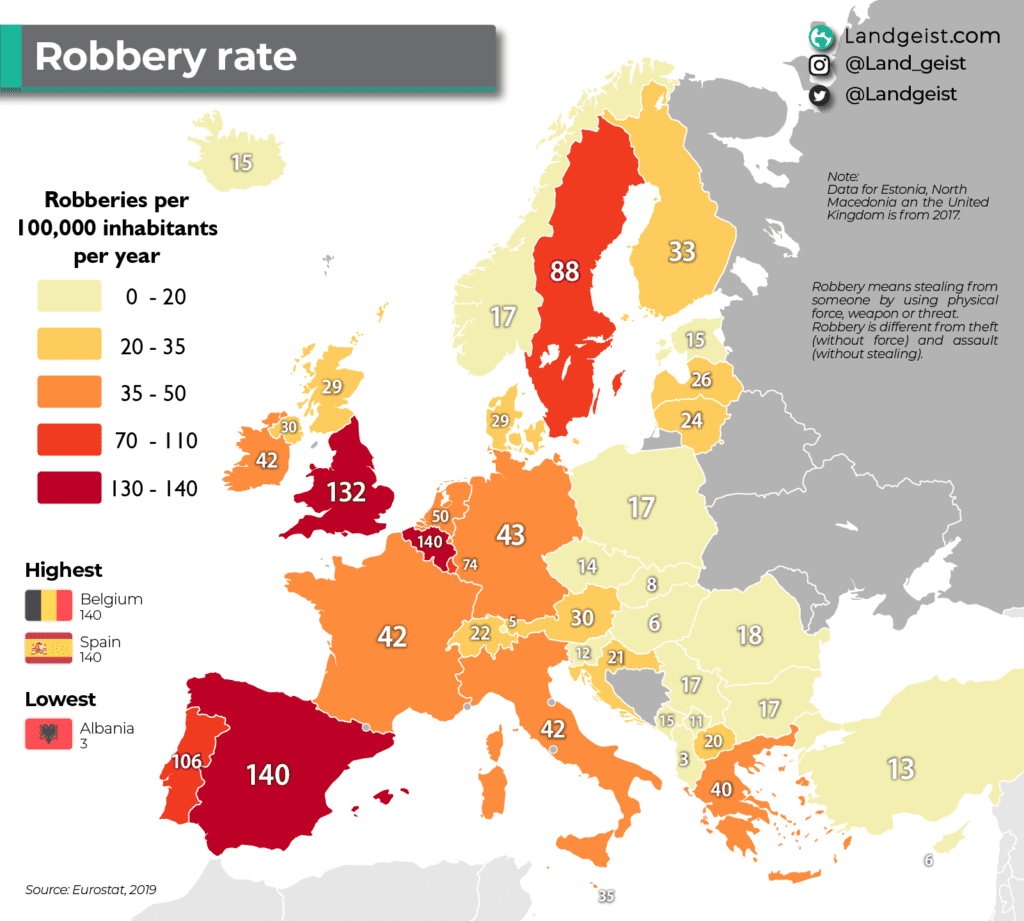Although the Western media heaps ample scorn on Hungary and Poland, there is no denying that these countries are safer places to live in comparison to Western nations when it comes to crime and terrorism, with a data map from Landgeist revealing the vast difference in robbery rates between European nations.
The map, which is based on data from Statista, shows that in Hungary only six robberies occur per 100,000 people per year, while Czechia has 14 and Poland has 17 robberies for every 100,000 people. These figures are dramatically lower than other Western nations, such as Belgium and Spain, where a whopping 140 robberies occur every year for every 100,000 people. That means you are approximately 23 times more likely to be robbed in Belgium than if you are in Hungary.

Britain is not far behind, with 132 robberies per 100,000 people.
Sweden stands at 88, Germany at 43, France at 42, and the Netherlands at 50 robberies per 100,000 people per year.
In general, the East of Europe had far lower robbery rates than the West.
As Remix News has previously reported, crime has risen dramatically in Western European nations, and much of the contrast between Hungary and nations like Britain and Sweden has to do with migration. Swedish police chiefs have, for instance, placed the blame for much of the rising crime rates on migrant clan gangs, of which there are now over 40 operating in Sweden. In Paris, France, nearly half of all criminals are foreign-born in certain departments. Data from the country’s transport system also shows that 92 percent of all petty thefts were committed by foreigners.
In Germany, migrants are responsible for 38 percent of all crimes despite being a small share of the population, and are highly over-represented in serious crimes like murder and robbery.
Poverty does not necessarily explain the massive differences in crime between East and West either. Although countries like Hungary have a slightly higher poverty rate than France, Hungary is overall a far safer nation to live in. One of the primary contrasts is that countries like Hungary and Poland refused to accept migrant quotas and feature far lower migrant populations overall.
Conservative governments in both nations have not been shy at placing the blame for the higher crime rates and a wave of terrorist attacks in the West on the affected nations’ acceptance of multiculturalism and mass migration.
Hungarian Prime Minister Viktor Orbán said in 2020 that the West has chosen the path of migration, and it has led to dramatically different outcomes:
“I also see that law enforcement and police are on the streets and yet there is a wave of violence. Statues are being toppled, the conditions are deplorable, and there are gang wars on the beautiful streets of small towns in civilized Western European countries. I look at the countries of those who are advising us how to conduct our lives properly and on good governance, proper operation of democracy, and I don’t know whether to laugh or cry.”
It is not just robbery rates or gang violence, either. Terrorism is virtually non-existent in Central and Eastern European nations, and the issue of Islamic terrorism is nearly a non-factor, predominantly because so few Muslims live in these nations. After the Vienna terror attacks last year, Hungarian security policy expert Georg Spöttle said, “Fortunately, the threat in Hungary is not as high as in Austria, Germany or France, because we hardly have any immigrants from Islamic countries here.”






